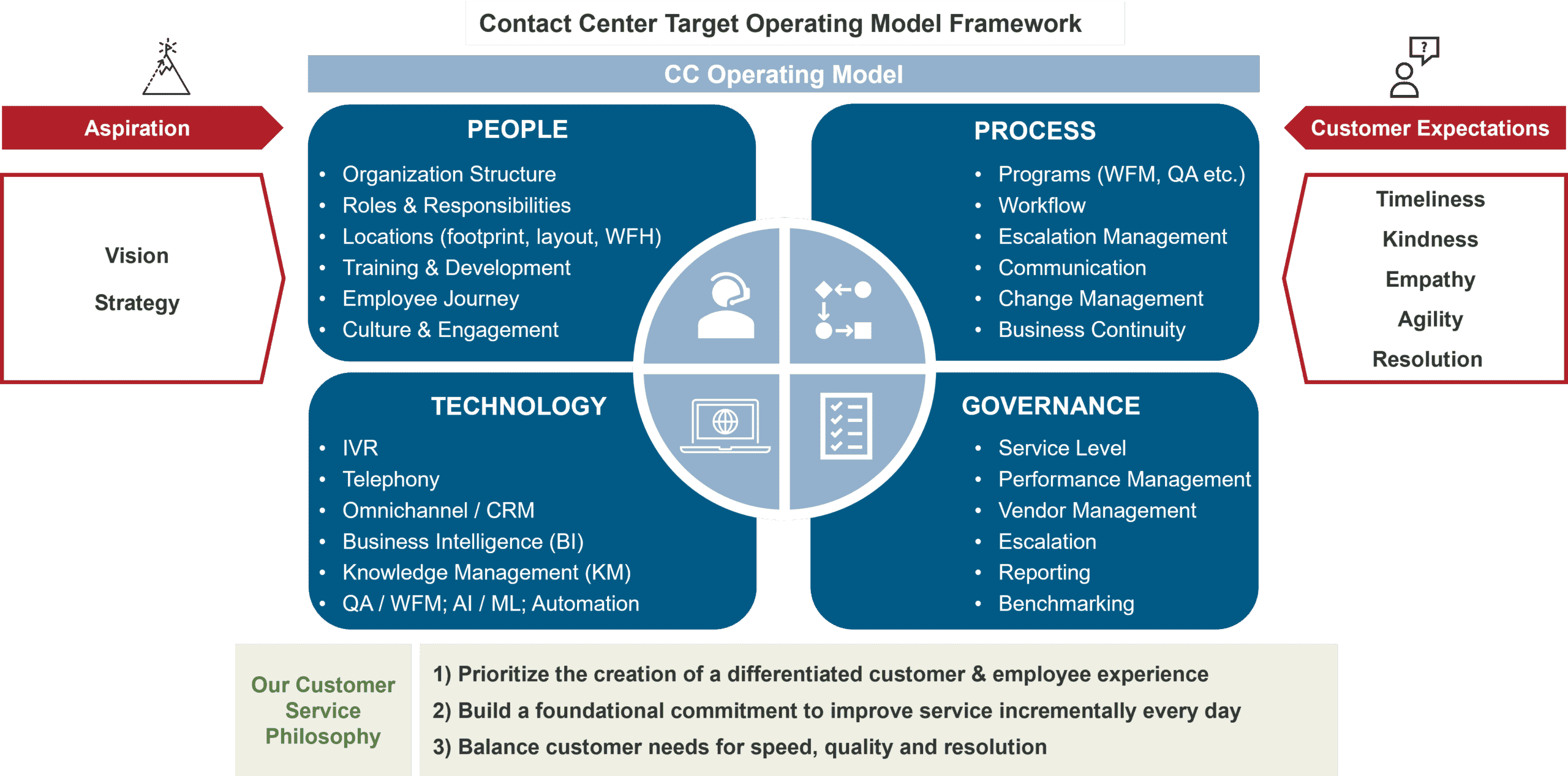Burnie Group’s contact center transformation offering is designed to help organizations achieve their key strategic priorities—increasing digital adoption, creating a seamless omnichannel customer experience, leveraging technology to handle calls more efficiently, optimizing revenue generation, and improving first call resolution (FCR). Our contact center solutions improve both customer and employee experiences, resulting in higher CSAT scores, increased employee engagement, and measurable business outcomes.
How we transform contact centers
The foundation of how we transform contact centers’ operations emanates from four pillars: people, process, technology, and performance & governance. We consider all four pillars in each engagement to ensure a holistic approach, aligning them with your organization’s strategic objectives. Additionally, we help clients implement our proven change management approach to ensure flawless execution.

People
Well-trained contact center employees are critical to its success. We help you create a strategy to develop and retain top-notch employees.
- Drive retention and satisfaction by establishing a more effective employee engagement framework
- Foster accountability by redesigning organizational structure, and roles and responsibilities to empower employees and enable effective decision-making (leveraging frameworks such as RAPID, RACI, etc.)
- Ensure skilled employees are in the right place at the right time to meet customer needs by enhancing workforce management practices
- Accelerate employees’ speed-to-proficiency by improving training programs and leveraging technology (e.g., Agent-Assist)
- Reduce attrition and boost motivation by better investing in career development, incentives, and employee recognition
Process
We help you develop processes to ensure your contact center runs smoothly.
- Establish a continuous improvement framework leveraging Lean Principles
- Optimize the voice channel by designing and implementing intelligent call routing and increasing containment through conversational IVRs
- Enhance efficiency, eliminate roadblocks, and address operational pain points by redesigning current processes
- Measure contact center performance by developing a robust KPI scorecard
- Drive efficiency by establishing centers of excellence (CoEs)
- Optimize staffing levels with robust workforce management (WFM) processes
- Maintain service excellence through the development and execution of quality assurance (QA) programs
- Establish a scalable project management framework to drive initiatives
- Ensure operational resilience by creating business continuity and disaster recovery plans
Technology
Our contact center consultants implement automation and technologies to enhance efficiency and enable customer self-service.
- Assess your contact center’s technology needs, including in-depth evaluations of specific tools like IVR, telephony, and chatbots
- Implement technologies to streamline operations and encourage customer self-service, including:
- Contact Center as a Service (CCaaS)
- Interactive voice response (IVR) to intelligent virtual assistants (IVA) powered by conversational AI
- Intelligent call routing
- Chatbots and Virtual Assistants
- Predictive AI, Generative AI, and Speech Analytics
- Agent-Assist (real-time AI-powered employee guidance)
- Customer Relationship Management (CRM)
- In-app messaging for social media
- Email management
- Share best practices for customer and employee adoption of these contact center technologies
Performance and governance
We help you establish a framework to monitor, manage, and continuously improve contact centre performance while ensuring alignment with organizational goals.
- Track success, identify gaps, and drive continuous improvement by defining and monitoring the right key performance indicators (KPIs)
- Obtain actionable insights to enhance operations through benchmarking 30+ quantitative KPIs against industry peers and global best practices
- Optimize service delivery by designing the right operating model, including onshore vs. offshore and remote vs. hybrid structures
- Enhance accountability and boost efficiency by implementing strong performance management/ reporting systems
- Establish strong alignment between the contact center and corporate strategy by assigning clear decision-making authorities and defining decision-making processes
Change management: We leverage our framework to develop a comprehensive, structured plan to help your people navigate organizational change.
We collaborate with leaders to ensure that employees have the desire to change and the supporting mechanism they need to implement and maintain the change.
Our approach
We tailor projects to meet your unique needs, following a proven, phased methodology to quickly identify challenges, uncover root causes, and deliver impactful solutions. While each project is customized, most follow these key phases:
- Current State Assessment
We collaborate with your team to evaluate the current state, identifying key challenges and opportunities for improvement. This includes analyzing your business model, documenting pain points, and aligning on priorities through interviews and workshops. - Solution Design
We design the future state by refining processes, organizational structures, and technology frameworks. This phase also includes developing performance metrics, decision frameworks, and financial models to align your resources and goals. - Roadmap
We create a clear roadmap with defined milestones, workstreams, and potential risks, ensuring smooth progress through tracking systems and regular project cadences. - Implementation
We provide end-to-end implementation support, including project management, change management, and training, ensuring a seamless transition from strategy to execution.
Why choose Burnie Group
- Burnie Group brings extensive experience in optimizing contact centers and enhancing customer experiences through projects across banking, insurance, and telecommunications industries, leveraging technologies like automation, machine learning, and AI (e.g., Agent-Assist, sentiment analysis, QA, etc.)
- We have deep expertise with leading contact center technology platforms, including Genesys, NICE, IEX, Avaya, Verint, AWS, Interactions, Cogito, and Intradiem
- We combine deep contact center operations expertise with our award-winning automation capabilities to transform your contact center operations. We are the first professional services firm in North America to deliver contact center automation at some of Canada’s largest contact centers
- We possess deep IVR and routing expertise covering all aspects, including functional capabilities, optimization, design, testing, and implementation. We are contact center experts at our core and have a deep understanding of related technologies
- Our proven track record includes designing and implementing contact center systems for numerous organizations, delivering enhanced customer experience and operational efficiencies



